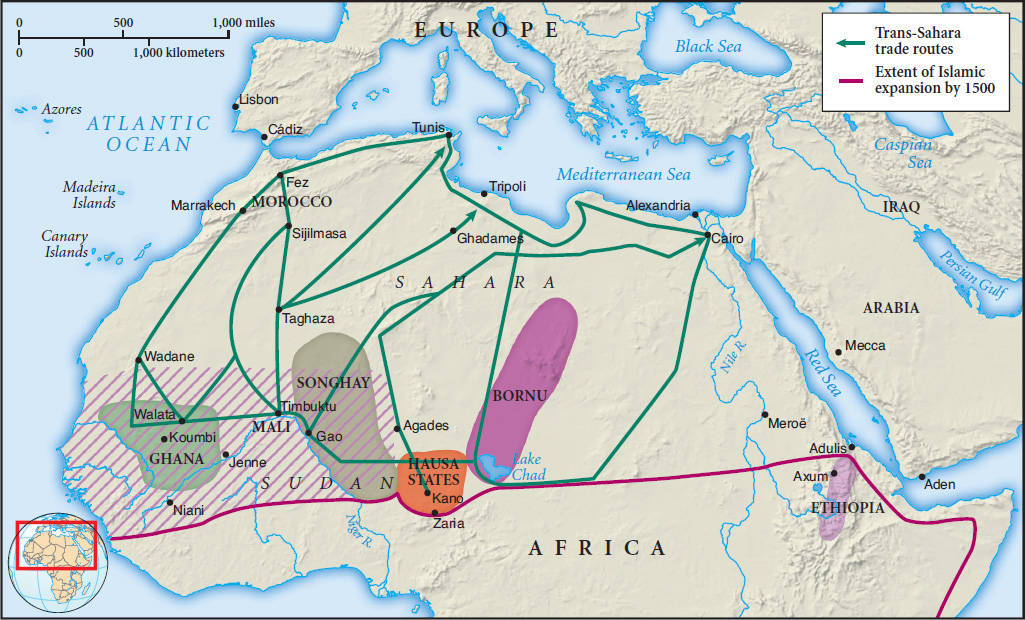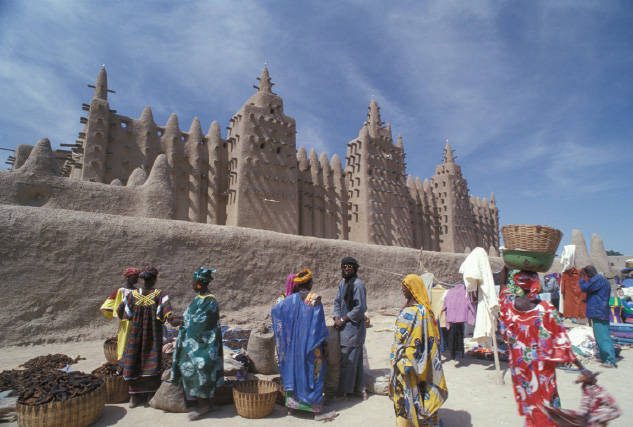The Case of West Africa
Still another pattern of Islamic expansion prevailed in West Africa. Here Islam accompanied Muslim traders across the Sahara rather than being brought by invading Arab or Turkic armies. Its gradual acceptance in the emerging civilization of West African states in the centuries after 1000 was largely peaceful and voluntary, lacking the incentives associated elsewhere with foreign conquest. Introduced by Muslim merchants from an already Islamized North Africa, the new faith was accepted primarily in the urban centers of the West African empires—Ghana, Mali, Songhay, Kanem-Bornu, and others (see Map 9.6 and the portrait of Mansa Musa). For African merchant communities, Islam provided an important link to Muslim trading partners, much as Buddhism had done in Southeast Asia. For the monarchs and their courts, it offered a source of literate officials to assist in state administration as well as religious legitimacy, particularly for those who gained the prestige conferred by a pilgrimage to Mecca. Islam was a world religion with a single Creator-God, able to comfort and protect people whose political and economic horizons had expanded well beyond the local realm where ancestral spirits and traditional deities might be effective. It had a religious appeal for societies that were now participating in a wider world.

By the sixteenth century, a number of West African cities had become major centers of Islamic religious and intellectual life, attracting scholars from throughout the Muslim world. Timbuktu boasted more than 150 lower-level Quranic schools and several major centers of higher education with thousands of students from all over West Africa and beyond. Libraries held tens of thousands of books and scholarly manuscripts (see the image of a Muslim astronomical observatory). Monarchs subsidized the construction of mosques as West Africa became an integral part of a larger Islamic world. Arabic became an important language of religion, education, administration, and trade, but it did not become the dominant language of daily life. Nor did West Africa experience the massive migration of Arab peoples that had promoted the Arabization of North Africa and the Middle East. Moreover, in contrast to India and Anatolia, Sufi holy men played a far more modest role until at least the eighteenth century. Scholars, merchants, and rulers, rather than mystic preachers, initially established Islam in West Africa.

Islam remained the culture of urban elites and spread little into the rural areas of West Africa until the nineteenth century. No thorough religious transformation occurred in West Africa as it had in Anatolia. Although many rulers adopted Islam, they governed people who steadfastly practiced African religions and whose sensibilities they had to respect if social peace were to prevail. Thus they made few efforts to impose the new religion on their rural subjects or to govern in strict accordance with Islamic law. The fourteenth-century Arab visitor Ibn Battuta was appalled that practicing Muslims in Mali permitted their women to appear in public almost naked and to mingle freely with unrelated men. “The association of women with men is agreeable to us,” he was told, “and a part of good conduct to which no suspicion attaches. They are not like the women of your country.”24 Ibn Battuta also noted with disapproval a “dance of the masks” on the occasion of an Islamic festival and the traditional practice of sprinkling dust on their heads as a sign of respect for the king. (See Document 7.3 for a fuller account of Ibn Battuta’s travels in West Africa.) Sonni Ali, a fifteenth-century ruler of Songhay, observed Ramadan and built mosques, but he also consulted traditional diviners and performed customary sacrifices. In such ways, Islam became Africanized even as parts of West Africa became Islamized.